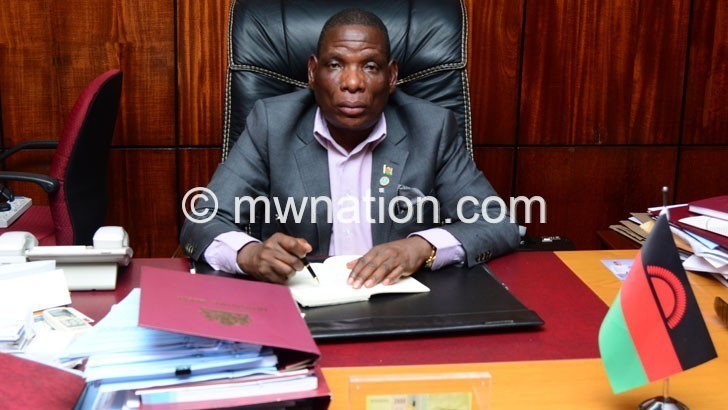Treasury In the dark
Ministry of Finance, Economic Planning and Development says it is not aware that Malawi Electoral Commission (MEC) has hired South African lawyers for the presidential election nullification appeal case.
On Wednesday, MEC chairperson Justice Jane Ansah confirmed the hiring of four South African lawyers in a $788 500 (about K600 million) contract signed by South African law firm Mboweni Maluleke Inc Attorneys, after the contract document went viral on social media.
But both Minister of Finance, Economic Planning and Development Joseph Mwanamvekha and Secretary to Treasury Cliff Chiunda in separate interviews yesterday expressed ignorance on the matter.

Mwanamvekha said in a telephone interview he learnt of the matter in the media, adding he is officially not aware of any government arrangement to hire foreign lawyers for the elections case.
He said: “Maybe the ST [Secretary to Treasury] would know because he is usually copied where issues of funding are concerned. The minister is not copied. So, I cannot comment further.”
Asked if the expenditure was justifiable given the state of the country’s economy, the minister said he could not competently comment on an issue that he did not know.
Treasury was copied a letter purported to be from Attorney General Kalekeni Kaphale to Umodzi Hotel Limited Park dated March 11 2020, asking the hotel to allow the four lawyers settle their lodging bills later as government was working on “procurement protocols”.
However, when contacted, Chiunda, too, said he had not seen the purported communication from Kaphale which he is copied alongside MEC chairperson and one of the SA lawyers, Gideon Phalatse.
Efforts to speak to both MEC and the Public Procurement and Disposal of Assets Authority (PPDA) yesterday were futile and they both did not respond to our questionnaires on the contract procurement.
The Public Finance Management Act empowers both the minister responsible for Finance and Secretary to Treasury with the mandate to oversee public finance, which include monitoring expenditure for all institutions that benefit from public funds.
Meanwhile, a former minister of finance, who spoke on condition of anonymity, said in a telephone interview it is unlikely that Treasury is not aware of the contract between MEC and South African lawyers.
Said the former minister: “Funding comes from Treasury and it is usually on request. So, in this case, MEC must have requested for funding for this particular activity, hence, there are high chances that Treasury is in the know.
“If the minister and the ST are not aware, then we are not following the law. How do they control expenditure when they are not informed? This is a huge expenditure.”
On his part, Budget and Finance Committee of Parliament chairperson Sosten Gwengwe also said as a matter of procedure, Treasury is supposed to know of this contract.
Gwengwe, also a former Cabinet minister, said although MEC was supposed to seek a no objection order from the PPDA, Treasury should have been communicated as no payment can be made without Treasury’s knowledge and approval.
He further expressed worry that MEC seemed to have settled for single-sourcing, saying there is need for answers from both MEC and PPDA, which approved the agreement on this.
Said Gwengwe: “PPDA must explain if they gave a no objection to this deal which appears to be a single sourcing. Are there compelling reasons for single sourcing and the sourcing of services outside the country amidst fiscal pressure? Treasury, too, has to explain as to which budget line is financing this contract? The whole arrangement to me appears to be a shady deal.”
PPDA director general Elias Hausi, when contacted yesterday, said he was in a board meeting and would return our call but he did not despite several reminders.
MEC spokersperson Sangwani Mwafulirwa, on the other hand, asked for more time while MEC chairperson Jane Ansah’s phone went unanswered.
Section 37 of the PPDA Act states that public procurement shall be realised by means of open methods of tender proceedings and a waiver to this general rule can be applied on exceptions–for example, in the case of national defence or national security-related procurement to the extent that such procurement is determined to be of a sensitive nature, in accordance with regulations.
The law also provides for restricted tender in defined circumstances such as when the goods, works or services are only available from a limited number of suppliers and the time and cost of considering a large number of bids is disproportionate to the value of the procurement.
The hired South African lawyers are Phalatse, Dumisa Ntsebenza, SC, Elizabeth Makhanani Mere and Caphus Mboweni.





